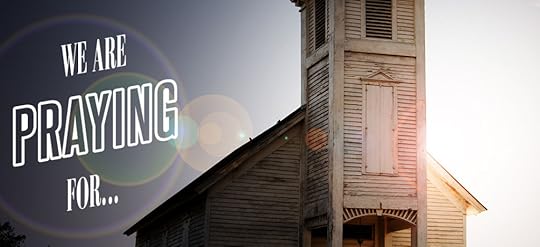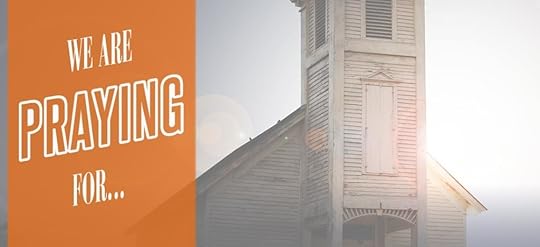Thom S. Rainer's Blog, page 133
January 22, 2019
Understanding the Internet Church as a Entry Point to the Physical Gathering – Rainer on Leadership #504

Podcast Episode #504
SUBSCRIBE:
iTunes • RSS • Stitcher • TuneIn Radio • Google Play • iHeart Radio • Spotify
The term “internet church” brings a mix of emotions and reactions from church leaders, but if your church is online, there are a few best practices to cover. Today, we discuss eight of them.
Some highlights from today’s episode include:
Even if your church live-streams services, the physical gathering should be emphasized and be the priority.
Point to groups in your preaching to get people more involved in the community of the church.
When people give to a church, they become more connected to a church.
If you have an online service presence, you need an online prayer presence.
The eight points that we discuss are:
Some people really cannot attend
Clearly indicate the importance of the physical gathering to the internet church
Provide discipleship resources
Point to groups in the community
Be bold about seeking financial stewardship participation
Have a vibrant prayer ministry
The necessity of a champion for the internet church
Be creative in internet worship services
Resources mentioned in today’s podcast
Prayer Engine
Pro-nounce
John Crist Virtual Reality Church
Brainerd Baptist Church Sermon Bumper
Rainer on Leadership is a member of the LifeWay Leadership Podcast Network
Episode Sponsors
 Vanderbloemen Search Group is the premier pastor search firm dedicated to helping churches and ministries build great teams. They’ve helped thousands of churches just like yours find their church staff and are uniquely geared to help you discern who God is calling to lead your church.
Vanderbloemen Search Group is the premier pastor search firm dedicated to helping churches and ministries build great teams. They’ve helped thousands of churches just like yours find their church staff and are uniquely geared to help you discern who God is calling to lead your church.
For more information, visit WeStaffTheChurch.com.
 The ministry landscape is changing, and the need for biblical training is more necessary than ever. It’s time to get your Master of Divinity degree. The M.Div —Midwestern Seminary’s flagship degree program — is the primary track for ministry preparation. At just 81 hours, the Midwestern M.Div offers a complete foundation for full-time ministry leaders, offering everything you need, and nothing you don’t. Join other students in vibrant Kansas City as you train in a unique collaborative environment focused on the local church or study online in your current ministry context. Midwestern Seminary is developing a discipleship culture devoted to the local church and committed to God’s unchanging Word. Why not start your training today?
The ministry landscape is changing, and the need for biblical training is more necessary than ever. It’s time to get your Master of Divinity degree. The M.Div —Midwestern Seminary’s flagship degree program — is the primary track for ministry preparation. At just 81 hours, the Midwestern M.Div offers a complete foundation for full-time ministry leaders, offering everything you need, and nothing you don’t. Join other students in vibrant Kansas City as you train in a unique collaborative environment focused on the local church or study online in your current ministry context. Midwestern Seminary is developing a discipleship culture devoted to the local church and committed to God’s unchanging Word. Why not start your training today?
Find out more at mbts.edu/mdiv.
Feedback
If you have a question you would like answered on the show, fill out the form on the podcast page here at ThomRainer.com. If we use your question, you’ll receive a free copy of Scrappy Church.
January 21, 2019
Five Perspectives That Help Me Deal with Criticisms

I am thin-skinned.
I do not like criticisms.
Perhaps many of you can say both of those statements with certitude. I know exactly how you feel. As one who has received criticisms over the years, I want to share with you personally five perspectives that have helped me deal with them. To be transparent, I don’t always focus on these perspectives. But, when I do, I find God working in me in a redemptive way.
I deserve criticisms. My first reaction to criticism is usually defensiveness. I want to show why I am right and the critic is wrong. But the truth of the matter is I am wrong quite often. I am truly a sinner who has fallen short of God’s glory. Who I am to say, “I don’t serve those criticisms”?
No one made me accept this position of leadership. If you lead, you will be criticized. If you don’t want to be criticized, don’t lead. It’s easy to get excited about the fun aspects of leadership. But it comes with struggles, pain, and criticisms. Leadership is not always fun and easy.
I need to pray for my critics. I don’t know what’s taking place in the lives of most of my critics. I don’t know their own hurts and struggles. I need to look out for the interests of others (Philippians 2:4). “Others” in that verse includes those who criticize me.
Most criticisms last for a brief season. I should do a better job keeping the long-term perspective. I can remember too many times when I reacted viscerally to criticisms, only to forget about them in a week. Even though some of the criticisms become a part of the indelible world of blogs and social media, most are forgotten quickly.
I need to have a better perspective of the cross. There is no trial, struggle, or criticism that comes close to the pain of the cross. My Savior suffered for me. He died for me. I should be ashamed of myself when I act like my world is falling apart because of petty criticisms.
Many of you readers are pastors and other church leaders. You get your share of criticisms. You know the pain. While I think I am unqualified to teach you anything about dealing with critics, I hope my own personal reflections have helped a bit.
And I appreciate you readers more than I could ever express adequately.
January 20, 2019
Pray for The Journey Church

Location: Lewisville, Texas
Pastor: Bruce White
Weekly Worship: 10:50 AM, Central
Fast Facts: The Journey Church relocated to a shopping center after meeting for eight years at a hotel conference room. The church is, strangely enough, located between a bar on one side and an Alcoholics Anonymous meeting room on the other. Pastor Bruce his leading the church to pray for those who would call the church home but rarely attend. Please pray for this effort. Also pray that The Journey Church may continue to reach out to the several apartment complexes in the surrounding area.
Website: TheJourneyBaptistChurch.org/
“Pray for . . .” is the Sunday blog series at ThomRainer.com. We encourage you to pray for these churches noted every Sunday. Please feel free to comment that you are praying as well.
If you would like to have your church featured in the “Pray for…” series, fill out this information form..
January 19, 2019
Notable Voices and the Week in Review: January 19, 2019

From Around the Web:
10 Bible Verses to Lean Into When You Feel Stressed — Art Rainer
Money is tight. The schedule is crammed. Work is overwhelming. The list could go on and on and on. Let’s be honest—life can get stressful. And when you find yourself stressed (which will happen), lean into Scripture. Feel free to use these verses as a starting point.
Gen Z More Likely to Head to College, Maybe Away From Church — Facts & Trends
Generation Z is going to college at a higher rate than previous generations and that may mean trouble for churches trying to keep them involved. Pew Research found a higher percentage of today’s high school graduates are choosing college compared to previous generations. Fifty-nine percent of 18-20 year olds today are enrolled in college, compared to 53 percent of millennials and 44 percent of those in Generation X.
7 Churches that Are Often Tough to Pastor — Chuck Lawless
Over the years, I’ve worked with a lot of pastors in difficult churches to lead. They’re not impossible—because nothing’s impossible for God (Matt. 19:26)—but they’re still tough to pastor:
4 Practical Ways Your Church Can Be Pro-Life — Daniel Darling
Churches around the country are marking this weekend as Sanctity of Life Sunday. Ever since the U.S. Supreme Court tragically legalized abortion in 1973, Christians have lamented unborn lives lost due to abortion on demand. The voice of the church is important on this issue and other issues of human dignity. So how can a church serve as a faithful witness and mobilize to stand up for the most vulnerable in our society? Here are four practical ways to be pro-life:
This Week at ThomRainer.com:

Five Reasons Why “We Pay the Bills” at This Church Is Such a Harmful Attitude
One of the most toxic statements a church member or group of church members can make is, “We pay the bills at this church”…READ MORE

Death by Church Meetings: Five Considerations
You might be surprised if you did an honest audit of your church meetings. And you might understand more fully why your members don’t have time to do real ministry…READ MORE
Why Tracking Church Attendance Is Important
by Thom Rainer and Jonathan Howe | Rainer on Leadership
http://media.blubrry.com/thomrainer/s3.amazonaws.com/TheExchange/Episode502.mp3
Why Your Church Attendance May Vary 25% Each Week
by Thom Rainer and Jonathan Howe | Rainer on Leadership
http://media.blubrry.com/thomrainer/s3.amazonaws.com/TheExchange/Episode503.mp3
How to Respond When the Members Don’t Want to Engage The Community
by Thom Rainer and Jonathan Howe | Revitalize & Replant
http://media.blubrry.com/revitalizereplant/s3.amazonaws.com/TheExchange/RevitalizeReplant/RR-Episode076.mp3
January 18, 2019
Why Your Church Attendance May Vary 25% Each Week – Rainer on Leadership #503

Podcast Episode #503
SUBSCRIBE:
iTunes • RSS • Stitcher • TuneIn Radio • Google Play • iHeart Radio • Spotify
Worship attendance swings can be dramatic in local churches. Today we discuss why that is and how to combat it.
Some highlights from today’s episode include:
Your church attendance pattern is more of a factor of what your church members are doing than an effect of cultural Christianity.
Churches with on-campus groups often have smaller attendance variances than those with off-campus or in-home groups.
When there is an entry point for church membership, member accountability is higher and involvement is usually greater.
Sunday morning can be a difficult time to make it to worship for up to 1/3 of your community due to work arrangements or other factors.
The six points we discuss are:
It’s not all cultural
The power of on-campus groups
Leadership involvement > ministry involvement
Still more emphasis on entry points
Urgent follow-up on entry points
Is it time for a renewal of options?
Resources mentioned in today’s podcast
Church Answers
Assimilation Checklist
Episode Sponsors
 The ministry landscape is changing, and the need for biblical training is more necessary than ever. It’s time to get your Master of Divinity degree. The M.Div —Midwestern Seminary’s flagship degree program — is the primary track for ministry preparation. At just 81 hours, the Midwestern M.Div offers a complete foundation for full-time ministry leaders, offering everything you need, and nothing you don’t. Join other students in vibrant Kansas City as you train in a unique collaborative environment focused on the local church or study online in your current ministry context. Midwestern Seminary is developing a discipleship culture devoted to the local church and committed to God’s unchanging Word. Why not start your training today?
The ministry landscape is changing, and the need for biblical training is more necessary than ever. It’s time to get your Master of Divinity degree. The M.Div —Midwestern Seminary’s flagship degree program — is the primary track for ministry preparation. At just 81 hours, the Midwestern M.Div offers a complete foundation for full-time ministry leaders, offering everything you need, and nothing you don’t. Join other students in vibrant Kansas City as you train in a unique collaborative environment focused on the local church or study online in your current ministry context. Midwestern Seminary is developing a discipleship culture devoted to the local church and committed to God’s unchanging Word. Why not start your training today?
Find out more at mbts.edu/mdiv.
 Vanderbloemen Search Group is the premier pastor search firm dedicated to helping churches and ministries build great teams. They’ve helped thousands of churches just like yours find their church staff and are uniquely geared to help you discern who God is calling to lead your church.
Vanderbloemen Search Group is the premier pastor search firm dedicated to helping churches and ministries build great teams. They’ve helped thousands of churches just like yours find their church staff and are uniquely geared to help you discern who God is calling to lead your church.
For more information, visit WeStaffTheChurch.com.
Feedback
If you have a question you would like answered on the show, fill out the form on the podcast page here at ThomRainer.com. If we use your question, you’ll receive a free copy of Becoming a Welcoming Church.
January 17, 2019
How to Respond When the Members Don’t Want to Engage The Community – Revitalize & Replant #076

SUBSCRIBE TODAY:
iTunes • RSS • Stitcher • TuneIn Radio • Google Play • Spotify
Community involvement is central to church revitalization. It’s the best way for your church to increase its evangelistic focus and move outwardly.
This Week’s Question:
FROM MIKE — I have been trying for 10 years to revitalize a church. I have recently come to realize the members don’t want to minister to the community. They do not feel that mingling with the community is glorifying to God and would somehow taint their sanctification. How would you respond to my situation?
Episode Highlights:
One of the biggest catalysts for change is discontent.
You know something is an idol if you’re afraid of losing it.
Pastors, your love for your church’s community should be obvious to your church members.
Reaching your community always start with having compassion for those in the community.
The seven questions we cover are:
Have your members faced any type of harsh reality (have they experienced sufficient pain to change)?
What is your process of equipping people one by one?
What do you do to set the example?
Have you celebrated sufficiently?
Do you have a system of healthy groups in the church?
Have you reviewed the ministries you are currently doing in your church?
What do you communicate in your new members’ class?
Resources mentioned in this episode include:
ChurchAnswers.com
RevitalizeBundle.com
ChurchReplanters.com
Replanter Assessment
Find more resources at the Revitalize & Replant page at ThomRainer.com

Revitalize & Replant is sponsored by the North American Mission Board and ChurchReplanters.com. More than 10% of churches in North America are at risk of closing and the North American Mission Board is committed to reversing this trend by decreasing the death rate of existing churches while simultaneously increasing the birth rate of new churches. To learn more about what it means to become a replanting pastor or to explore resources for replanting and revitalization in your own church, visit ChurchReplanters.com.
Submit Your Question:
Do you have a question about church revitalization or replanting for us to use on the podcast? Visit the podcast page to submit your question. If we use it on the show, you’ll get a copy of Autopsy of a Deceased Church and Reclaiming Glory.
January 16, 2019
Death by Church Meetings: Five Considerations

He calls it “the most painful problem in business.”
Patrick Lencioni, in his book, Death by Meeting, looks at one of the greatest resource wastes in businesses: too much time in meetings.
I have worked with churches for over 30 years. It’s even more painfully true in congregations.
Here is one real example. I worked with a church of 250 in attendance that had a monthly business meeting that lasted at least two hours; weekly deacon meetings that lasted at least two hours; and 13 committee meetings that met at least one hour each month (yes, you read that right – 13 committee meetings).
The business meeting averaged about 75 in attendance. The deacon meetings had 11 in attendance, including staff. Each committee had an average of 5 in attendance.
Oh, I almost forgot. The ministry staff of four met two hours each week for a staff meeting.
Do the math. The total person hours in meetings each month for the church was 335 hours. The total person hours in meetings in a year was 4,020 hours.
Wouldn’t you love to have over 4,000 hours in Great Commission activity each year?
Many of our churches are dying to death due to meetings. While I would not recommend the total eradication of meetings, I do recommend churches conduct a meeting audit. Most churches are in meetings as much as five to ten times more than they need to be.
So, what can we do in our churches to reduce the time in meetings? What can we do to get more time in ministry from our members? Here are five considerations.
If you have a monthly business meeting, stop it! Consider a quarterly, semi-annual, or even an annual meeting. You can keep the congregation informed on such matters as finances and ministries through digital newsletters. And you can always call a special meeting if you need one.
Change most of your committees to task forces. Once the task force completes its work, it ceases to exist. One of the greatest miracles in our churches today is the multiplication of committees. By the way, you don’t need a flower committee; you just need someone to take care of the flowers, real or dusty plastic.
Change your longer weekly staff meeting to a 15- to 20-minute stand-up staff meeting. You don’t need a two- to three-hour staff meeting every week. Limit the longer meetings to monthly meetings.
Communicate with modern technology. Not every meeting needs to take place. Much of that time can be replaced with emails, texts, and communication through software like Slack and Asana.
If you must have a meeting, have a clear agenda with a specific time. I am a part of a homeowners’ association that will not cover any items unless they are placed on the agenda. The chairperson sets a time limit for each item with a visible stopwatch. Maybe such rigor is not for churches, but congregations can still follow basic committee time management principles.
How many person hours does your church meet every year? You might be surprised if you did an honest audit. And you might understand more fully why your members don’t have time to do real ministry.
January 15, 2019
Why Tracking Church Attendance Is Important – Rainer on Leadership #502

Podcast Episode #502
SUBSCRIBE:
iTunes • RSS • Stitcher • TuneIn Radio • Google Play • iHeart Radio • Spotify
Numbers are important, but they aren’t ultimate in the church. Today, we discuss why you should be counting and how, but we also discuss how to avoid making numbers your focus.
Some highlights from today’s episode include:
There is no reason to have an aversion to numbers as a church leader.
Tracking numbers is a stewardship and accountability issue.
You need a consistent method for counting worship attendance in your church.
The more someone is involved in the ministries of the church, the more they will invest financially in the church.
The seven reasons that we discuss are:
We must overcome our aversions to numbers
Two most common areas to track: worship and groups
Knowledge of attendance leads to better pastoral care
Knowledge of attendance leads to better stewardship
Those who do the counting in worship service usually provide great insights
Attendance is a key indicator of discipleship
Avoid the classic pitfalls of attendance counting
Resources mentioned in today’s podcast
Invite Your One
Church Answers Gold
Rainer on Leadership is a member of the LifeWay Leadership Podcast Network
Episode Sponsors
 Vanderbloemen Search Group is the premier pastor search firm dedicated to helping churches and ministries build great teams. They’ve helped thousands of churches just like yours find their church staff and are uniquely geared to help you discern who God is calling to lead your church.
Vanderbloemen Search Group is the premier pastor search firm dedicated to helping churches and ministries build great teams. They’ve helped thousands of churches just like yours find their church staff and are uniquely geared to help you discern who God is calling to lead your church.
For more information, visit WeStaffTheChurch.com.
 The ministry landscape is changing, and the need for biblical training is more necessary than ever. It’s time to get your Master of Divinity degree. The M.Div —Midwestern Seminary’s flagship degree program — is the primary track for ministry preparation. At just 81 hours, the Midwestern M.Div offers a complete foundation for full-time ministry leaders, offering everything you need, and nothing you don’t. Join other students in vibrant Kansas City as you train in a unique collaborative environment focused on the local church or study online in your current ministry context. Midwestern Seminary is developing a discipleship culture devoted to the local church and committed to God’s unchanging Word. Why not start your training today?
The ministry landscape is changing, and the need for biblical training is more necessary than ever. It’s time to get your Master of Divinity degree. The M.Div —Midwestern Seminary’s flagship degree program — is the primary track for ministry preparation. At just 81 hours, the Midwestern M.Div offers a complete foundation for full-time ministry leaders, offering everything you need, and nothing you don’t. Join other students in vibrant Kansas City as you train in a unique collaborative environment focused on the local church or study online in your current ministry context. Midwestern Seminary is developing a discipleship culture devoted to the local church and committed to God’s unchanging Word. Why not start your training today?
Find out more at mbts.edu/mdiv.
Feedback
If you have a question you would like answered on the show, fill out the form on the podcast page here at ThomRainer.com. If we use your question, you’ll receive a free copy of Scrappy Church.
January 14, 2019
Five Reasons Why “We Pay the Bills” at This Church Is Such a Harmful Attitude

One of the most toxic statements a church member or group of church members can make is, “We pay the bills at this church.” Not only is it unbiblical, it is clearly divisive. It creates an “us versus them” mentality in the church.
Why is the statement so harmful? Here are five reasons.
It makes giving more like paying country club dues than biblical stewardship. Thus, a certain level of giving by a member or a group engenders a sense of entitlement. The people who give with this attitude never really let go of the funds. They continue to hold on to them with strings of conditions.
It is manipulative. In essence, giving becomes a controlling mechanism. If the church doesn’t do what I want it to do, I will withhold my funds. I have known church members and groups of church members that have held onto funds until they finally got their way. At that point, they released the funds to the church. They were truly holding the church hostage.
It becomes a way of circumventing the budget. Most churches approve a budget every year. It becomes the guide for the church to steward the funds given to the congregation. On too many occasions, a malcontent in the church decides he or she doesn’t like the approved plans for spending, so they threaten to withhold their funds. One person told me smugly he knew the church was not spending funds in the best way, so his implied threats to withhold funds were I wonder what he thinks of the biblical story of the widow’s mite (Mark 12:41-44). She gave without reservation, but I doubt the Temple was the paragon of stewardship excellence.
It creates different classes of members in the church. There are those who have and who can make such threats, and there are those who do not have and, thus, have insufficient resources to make demands. As noted earlier, this statement is both inflammatory and divisive.
It is contrary to the servant spirit of Christ. Jesus was crystal clear on his mission. He did not come to be served, but to serve and to give His life as a ransom for many (Matthew 20:28). Some church members utter the toxic statement, “We pay the bills at this church” to get their own way. Jesus made the sacrificial statement that He would put others before Himself, so much so that He would die for others.
“We pay the bills at this church.”
It is a toxic statement.
It is an unbiblical statement.
It is contrary to the spirit in which the Lord Himself came to serve, to give, and to sacrifice.
January 13, 2019
Pray for Lynn Baptist Church

Location: Pawhuska, Oklahoma
Pastor: Ralph Stafford
Weekly Worship: 10:45 AM, Central
Fast Facts: Lynn Baptist Church was established as a mission from First Baptist Pawhuska, Oklahoma and later became an self-sufficient church more than 50 years ago. At its peak, it had around 100 members and now the average attendance is 20. The majority of the adult members are age 60 and above with 5 students from age 7 to 15. Since Pawhuska is in the Osage Nation, several members are Native American and members of the Osage and other tribes in Oklahoma. Pray for the church as they reach out to the surrounding neighborhood. The area has been identified as around 85% unchurched. Pray for growth and direction for the church as they try to reach the lost in their neighborhood and city.
“Pray for . . .” is the Sunday blog series at ThomRainer.com. We encourage you to pray for these churches noted every Sunday. Please feel free to comment that you are praying as well.
If you would like to have your church featured in the “Pray for…” series, fill out this information form..



